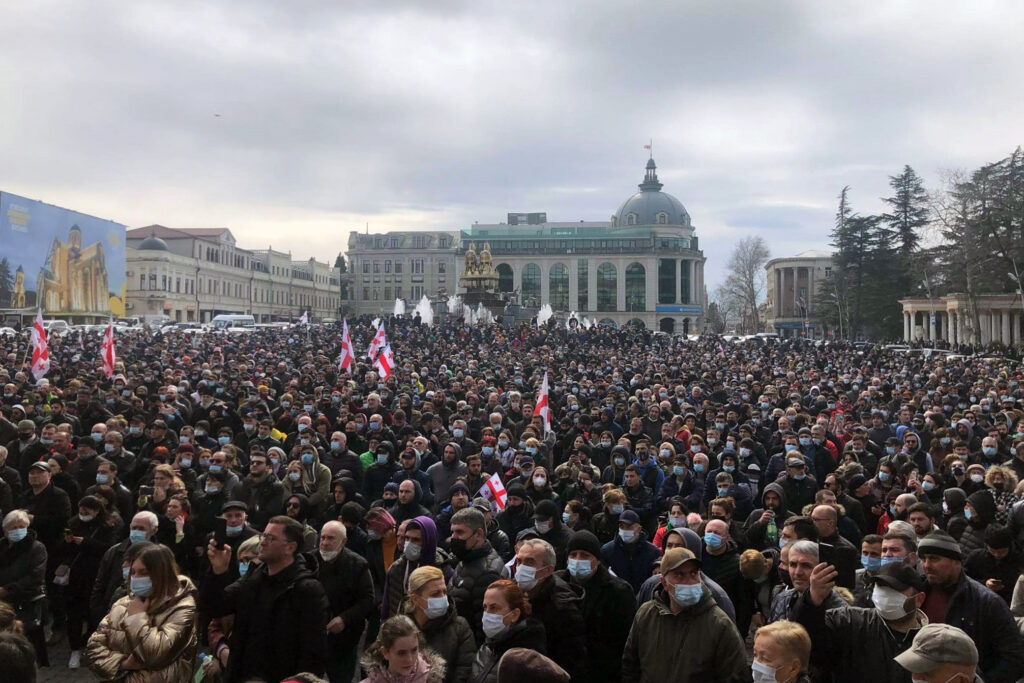Thousands have turned out to protest in Kutaisi against the construction of the nearby Namakhvani hydropower project
Protesters gathered on the west-Georgian city’s central square on Sunday calling on the authorities to revisit their ‘unlawful’ decision to support the project. Opponents have vowed to ‘picket’ the city in two weeks time if their demand is not met.
‘If they don’t take into account today’s meeting and what is happening here, we’ll agree to gather again in two weeks’, Varlam Goletiani, the leader of the campaign against the dam said during Sunday’s demonstration. ‘We’ll picket the city — park [our] cars, leave them and go home.’
The Namakhvani HPP cascade project is planned to be built in the Tskaltubo and Tsageri municipalities north of Kutaisi by Enka Renewables, a Turkish construction firm. Construction work is already underway under heavy police protection.
The project has met strong local resistance from a grassroots movement organised by local residents along the River Rioni Valley. Critics say the project will affect the environmental, social, and cultural setting in Georgia’s Imereti and Lechkhumi regions.
Activists chose Kutaisi — Georgia’s third-biggest city and the capital of Imereti Region — for Sunday’s demonstration after being evicted by police last November and again in February from the villages of Zhoneti and Namokhvani, north of Kutaisi.

Zhoneti and nearby localities, which had become permanent protest sites, are expected to be one of the first areas directly affected by the Namakhvani HPP Cascade Project with its 333 MW Lower Namakhvani-Zhoneti dam and power plant.
The Sunday rally in Kutaisi marked the 126th day of their protest, upheld with round-the-clock tents originally in Zhoneti and later moved to nearby Opurchkheti.
[Read more on OC Media: Activists protest dam construction in northwest Georgia]
Together with Nenskra Dam in the Svaneti region and Khadori 3 dam in Pankisi valley, Namakhvani is one of several hydropower projects in Georgia to have triggered resistance both from local residents and watchdog groups.
Understudied and excluding residents from the decision-making process
Opponents of the Namakhvani project have been critical of the Ministry of Environment for issuing early approval to Enka Renewables a year ago.
Frustration grew when the company, according to watchdog groups Georgian Young Lawyers Association (GYLA), Green Alternative, and EMC, started ‘preparatory works’ in Zhoneti on 22 February without providing ‘up to 25’ studies on the project’s environmental, social, and cultural impact demanded by even that disputed conditional approval.

Critics also highlight that local residents have been mostly deprived of participating in public discussions over the project, as per Georgia’s Environmental Assessment Code.
They also say the government has responded to their demands with a heavy police response, ensuring that the company’s work was not hindered. On 23 February, police apprehended one local activist after opponents tried to halt construction in the village of Namokhvani.
According to the Green Alternative, in November 2019 — months before the approval of preparatory works that was later reversed — the Georgian government transferred more than 5.5 square kilometres of state lands to Enka Renewables in Tsageri, Tskaltubo, and Tkibuli Municipalities.
Politicians are starting to pay attention
Advocacy for the rights of residents of the Rioni Valley to have a say in the approval of the Namakhvani project has been mostly limited to several rights groups in Georgia, including the Open Society — Georgia Foundation, as well as a handful of environmentalists and green and leftist groups in Tbilisi.
The grassroots movement, sometimes called the Guardians of Rioni Valley, have enjoyed only moderate support or silence from other Tbilisi-based civil society groups.
The movement became even less prominent after the political crisis in Georgia escalated following the detention of opposition leader Nika Melia.
Sunday’s protest in Kutaisi has partially changed this, with several political groups making statements. Opposition parties Lelo and Girchi, as well as Georgia’s third President and Honorary Chair of the United National Movement, Mikheil Saakashvili, voiced support to the demonstrations.
‘Hands off from Georgian nature!’, Mikheil Saakashvili called on the government in a video address on Facebook on the day of protest.
Pro-government TV media, including Imedi, was quick to circulate Saakashvili’s 2012 speeches in which he advocated for energy projects including Namakhvani.
On 6 February, Georgian Minister of Economy and Sustainable Development, Natia Turnava, dismissed criticism of the project, insisting that the project’s impact had been vigorously studied. She added that opposing the $800 million hydropower project equalled ‘lobbying for electricity imports’.




 1 March 2021
1 March 2021



